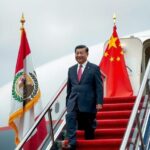Biden’s Strategic Visit to Angola: Strengthening U.S. Ties in Africa Amidst Global Competition
President Joe Biden will visit Angola to fulfill a two-year commitment, focusing on enhancing U.S. investment in Africa amidst China’s expanding influence. This marks the first visit to sub-Saharan Africa by a sitting U.S. president in years, aiming to strengthen ties through initiatives like the Lobito Corridor, while addressing ethical concerns accompanying foreign investments.
President Joe Biden is set to embark on a significant trip to Angola, fulfilling a commitment made two years ago, aimed at reinforcing United States investment in Africa amid increasing competition from China. This three-day visit is noteworthy as it marks the first time a sitting U.S. president has traveled to sub-Saharan Africa since 2015, and the first visit to Angola by a president in U.S. history. The initiative seeks to enhance bilateral relations and solidify economic partnerships, particularly through the Lobito Corridor project, designed to transport vital minerals from Central Africa to Angola’s port for export.
Biden’s journey not only illuminates the United States’ strategic intentions in the region but also highlights its response to China’s substantial investments in African infrastructure through the Belt and Road Initiative. With China’s President Xi Jinping’s recent pledge of $50 billion in support to Africa, this visit underscores the urgency for the U.S. to establish its presence and provide an alternative investment framework that adheres to higher standards of governance and ethical practices.
During his stay, Biden will meet with Angolan President João Manuel Gonçalves Lourenço and engage in discussions surrounding economic cooperation and development. He will also tour key sites such as the Lobito Port Terminal and highlight initiatives centered on health security and cultural preservation, including support for the Kwanza Corridor’s nomination as a UNESCO World Heritage Site. These developments signify a strategic pivot in U.S. foreign policy toward a framework focusing on sustainable partnerships rather than mere aid. The trip is not just an endeavor to revitalize U.S.-Africa ties but also serves as a demonstration of the Biden administration’s commitment to countering foreign influences, particularly from China and Russia, in the region.
The context of President Biden’s planned visit to Africa relates closely to the increasing geopolitical competition characterized by China’s extensive investments in the continent through initiatives like the Belt and Road Initiative, which have raised concerns within U.S. foreign policy circles. The Philippines is not alone; as countries across Africa grapple with the dilemma of choosing between Western investment and Chinese support, the Biden administration’s approach seeks to reaffirm the U.S. commitment to fostering sustainable development partnerships. With Biden’s predecessor Donald Trump poised to take office again, the visit also comes at a critical juncture where establishing lasting relationships during Biden’s term holds significant importance. Biden’s focus on strategic outcomes, such as the Lobito Corridor investment in Angola, pivots U.S. engagement from traditional aid models to a more reciprocal framework emphasizing commerce and collaboration.
In conclusion, President Biden’s forthcoming trip to Angola represents a pivotal moment in U.S.-Africa relations, emphasizing strategic investment and collaboration amid growing foreign influence, particularly from China. The visit aims to enhance economic ties through initiatives like the Lobito Corridor while promoting ethical standards in investment practices. Through this endeavor, the Biden administration seeks to solidify its legacy in Africa and position the United States as a key partner for sustainable development in the region.
Original Source: www.cnn.com








Post Comment